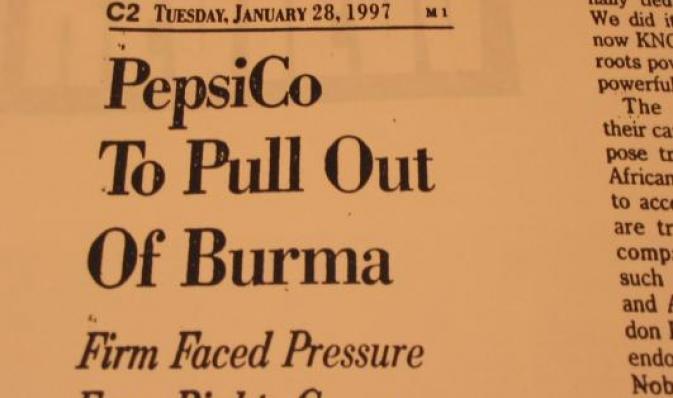
By Jay Mathews | Published by The Washington Post on January 28, 1997
PepsiCo Inc. has decided to pull all of its brands and business out of Burma, giving a major boost to a student and civic movement against U.S. economic involvement with the Southeast Asian country's military government.
In a statement sent Friday to the Maryknoll Fathers and Brothers religious community, which tried to bring shareholder pressure on PepsiCo to withdraw from Burma, PepsiCo's senior vice president and general counsel, Edward V. Lahey Jr., said: "Based on our assessment of the spirit of current U.S. government foreign policy, we are completing our total disengagement from the Burmese market."
Lahey said PepsiCo severed all ties with its Burmese bottler on Jan. 15, and expected that all production and distribution of company products there would cease by May 31. Pepsi officials, who once argued that free trade would help loosen the military grip, said they acted in recognition of toughened U.S. policy toward Burma and in deference to the wishes of many shareholders and customers.
Zar Ni, a Wisconsin graduate student who helped lead a 100-campus boycott against Pepsi, celebrated the decision with an exuberant e-mail message to other organizers: "We finally tied the Pepsi Animal down! We did it!! We all did it!!! . . . We now KNOW we have had the grass-roots power to yank one of the most powerful corporations in the world."
The organizers have modeled their campaign after the effort to impose trade sanctions on the South African government before it agreed to accept black majority rule. They are trying to persuade other U.S. companies, particularly oil giants such as Texaco Inc., Unocal Corp. and Atlantic Richfield Co., to abandon Burma. The campaign has been endorsed by Aung San Suu Kyi, the Nobel Peace Prize winner whose party was barred from power by the Burmese military in 1990 after winning more than 82 percent of legislative seats.
A woman answering the telephone at the embassy of Myanmar, the name given Burma by the military government, said no one there wished to comment on the PepsiCo action.
Campus organizers have considered PepsiCo particularly vulnerable to a college boycott because of the company's efforts to sell soft drinks to young consumers. It spent millions of dollars during Sunday's Super Bowl game advertising its "Generation Next" theme.
Groups such as Zar Ni's Free Burma Coalition persuaded Harvard University dining hall officials to discard a plan to replace Coca-Cola with Pepsi on campus and inspired a 2,000-signature petition that killed plans for a PepsiCo subsidiary Taco Bell restaurant on the Stanford University campus. Ten cities, including Takoma Park, and Massachusetts have enacted laws prohibiting municipal or state purchases of products from companies that do business with Burma.
A new U.S. law allows for trade sanctions against Burma if the government harms or rearrests Suu Kyi, or takes other actions against its democratic opponents. PepsiCo announced last year that it would sell its Burmese bottling plant, but until now said it would still allow its brands to be sold there.









